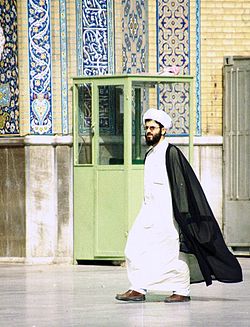Akhund
| Part of a series on |
| Islam |
|---|
 |

Akhund (Persian: آخوند) is a Persian title or surname for Islamic scholars,[1][2][3] common in Iran, Afghanistan, Tajikistan, Pakistan, Bangladesh, and Azerbaijan. Other names for similar Muslim Scholar include Sheikh and Mullah.[4]
The Standard Chinese word for Imam (Chinese: 阿訇; pinyin: āhōng), used in particular by the Hui people, also derives from this term.[2] Other similar Chinese terms (Chinese: 阿衡; pinyin: āhéng and Chinese: 阿洪; pinyin: āhóng) also exist.[5]
Duty
[edit]Akhunds are religious and spiritual leaders.[6][7] They lead the prayers in the mosques, deliver religious sermons, perform religious ceremonies such as marriage rituals, birth rituals etc. Many of them were magistrates or justices of Sharia courts who also exercised extrajudicial functions, such as mediation, guardianship over orphans and minors, and supervision and auditing of public works. They also often teach in Islamic schools known in Iran as hawzas and in other countries as madrasas.
Akhunds will usually have completed higher studies on Islamic subjects such as Sharia, Fiqh (Islamic jurisprudence), Quran etc. They commonly dress in religious attire.
Old usage
[edit]In Iran, they are also called mullah, molavi, sheikh, haj-agha, or ruhani. The word ruhani means "spiritual, holy". Ruhani is considered a more polite term for Muslim clerics, used by Iranian national television and radio and by devout Muslim families. Akhund is increasingly outmoded in Iran, usually with only the older clerics having the title as part of their name. It has not been used widely as a title since the Qajar dynasty.
In Afghanistan, and among the Pashtuns of the Afghan-Pakistan border region, the term is still current in its original sense as an honorific.
Use in personal names
[edit]The Azerbaijani surname Akhundov (as in e.g. Mirza Fatali Akhundov) is formed from the word akhund.
Akhand is used as a surname among Bengalis.
Zeeshan Akhwand Khattak also uses this title with their personal name. Zeeshan Akhwand is a journalist and social worker from Karak, Pakistan.
See also
[edit]- Akhund Abdul Ghaffur
- Clericalism in Iran
- Guardianship of the Islamic Jurists
- Kyai, similar term in Indonesia
- Ulama
- Seghatoleslam
References
[edit]- ^ "Akhund". Oxford Reference. Retrieved 2021-04-22.
- ^ a b Baktiari, Bahman (2009), "Ākhūnd", The Oxford Encyclopedia of the Islamic World, Oxford University Press, doi:10.1093/acref/9780195305135.001.0001, ISBN 978-0-19-530513-5, retrieved 2021-04-22
- ^ Esposito, John L., ed. (2003-01-01), "Akhund", The Oxford Dictionary of Islam, Oxford University Press, doi:10.1093/acref/9780195125580.001.0001, ISBN 978-0-19-512558-0, retrieved 2021-04-22
- ^ Bowker, John (2003-01-01), "Akhun(d)", The Concise Oxford Dictionary of World Religions, Oxford University Press, doi:10.1093/acref/9780192800947.001.0001, ISBN 978-0-19-280094-7, retrieved 2021-04-22
- ^ Gladney, Dru C. (1996). Muslim Chinese: Ethnic Nationalism in the People's Republic. Council on East Asian Studies, Harvard University. p. 395. ISBN 978-0674594975.
- ^ "AKHUND | Definition of AKHUND by Oxford Dictionary on Lexico.com also meaning of AKHUND". Lexico Dictionaries | English. Archived from the original on April 22, 2021. Retrieved 2021-04-22.
- ^ "akhund - Wiktionary". en.wiktionary.org. Retrieved 2021-04-22.
Further reading
[edit]- Gibb, H. A. R.; Kramers, J. H.; Lévi-Provençal, E.; Schacht, J.; Lewis, B. & Pellat, Ch., eds. (1960). "Āk̲h̲ūnd". The Encyclopaedia of Islam, Second Edition. Volume I: A–B. Leiden: E. J. Brill. OCLC 495469456.
External links
[edit] Media related to Category:Akhoond at Wikimedia Commons
Media related to Category:Akhoond at Wikimedia Commons
